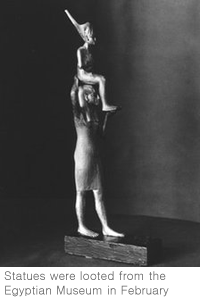 Unesco warning over Libya looting
Unesco warning over Libya looting The UN's cultural body has warned international art dealers and museums to look out for artefacts that may have been looted from Libya during fighting.
Unesco director-general Irina Bokova said in a statement that dealers should be "particularly wary of objects from Libya in the present circumstances".
And she called on Libyans to protect their "invaluable cultural heritage".
Libya has five World Heritage sites including Cyrene - one of the principal cities in the Hellenic world.
"Experience shows that there is a serious danger of destruction during times of social upheaval," Ms Bokova said in the Unesco statement.
"It has taught us to look out for looting by unscrupulous individuals, that often damages the integrity of artefacts and of archaeological sites."
She added that "careless dealers who buy these objects and fragments are in fact inciting more looting".
And she said she had contacted neighbouring countries to stress "the importance of the fight against the illicit trafficking and illegal export of cultural property".
Among Libya's World Heritage sites are Leptis Magna - considered one of the most beautiful cities of the Roman Empire - and the old town of Ghadames, an oasis known as the "pearl of the desert".
Ms Bokova also offered Unesco's help in assessing any damage at the sites and in making plans to safeguard them, "as soon as this becomes possible".
Unrest in the Middle East this year has led to acts of opportunistic looting of museums.
In February during protests in Cairo, the Egyptian Museum was targeted and 18 items stolen including a gilded wood statue of Tutankhamen being carried by a goddess.
And in 2010, experts warned that several years of armed conflict in Iraq had left the country "bleeding antiquities".
 Unesco warning over Libya looting
Unesco warning over Libya looting